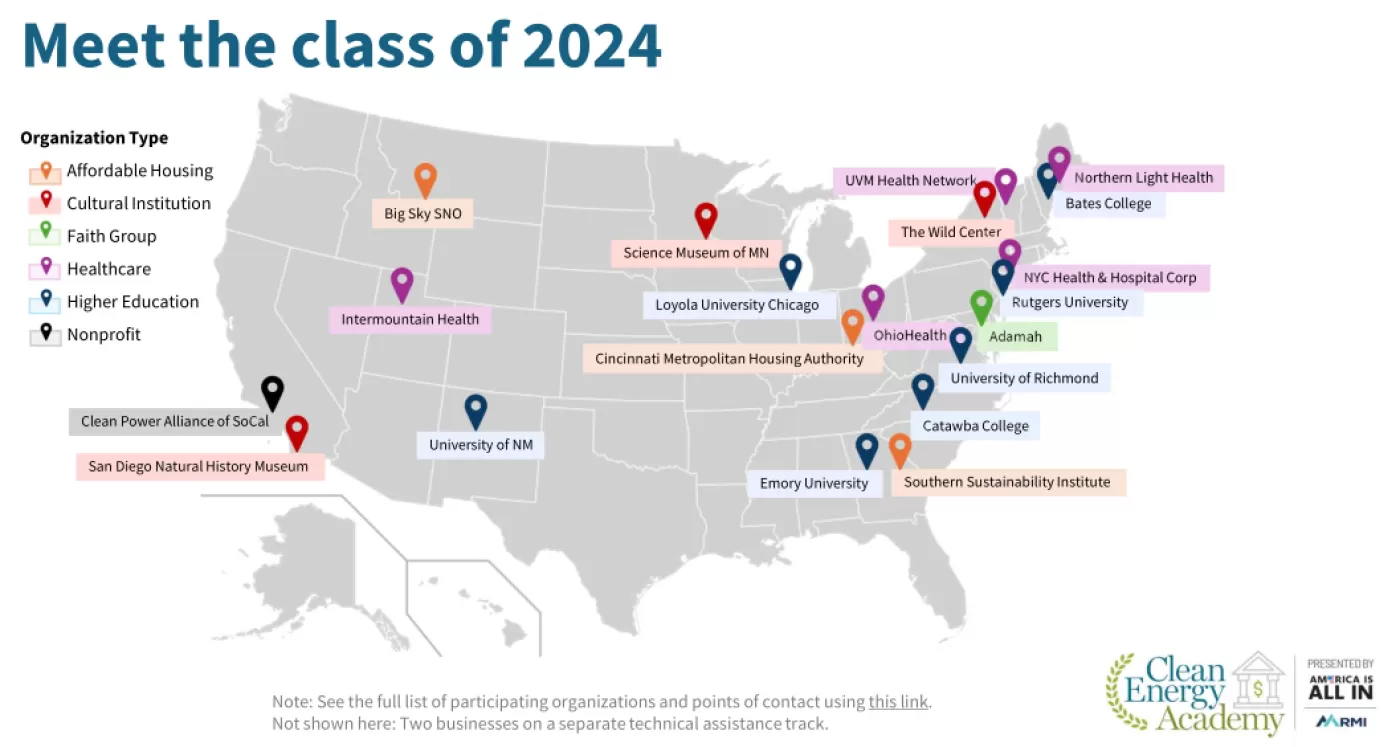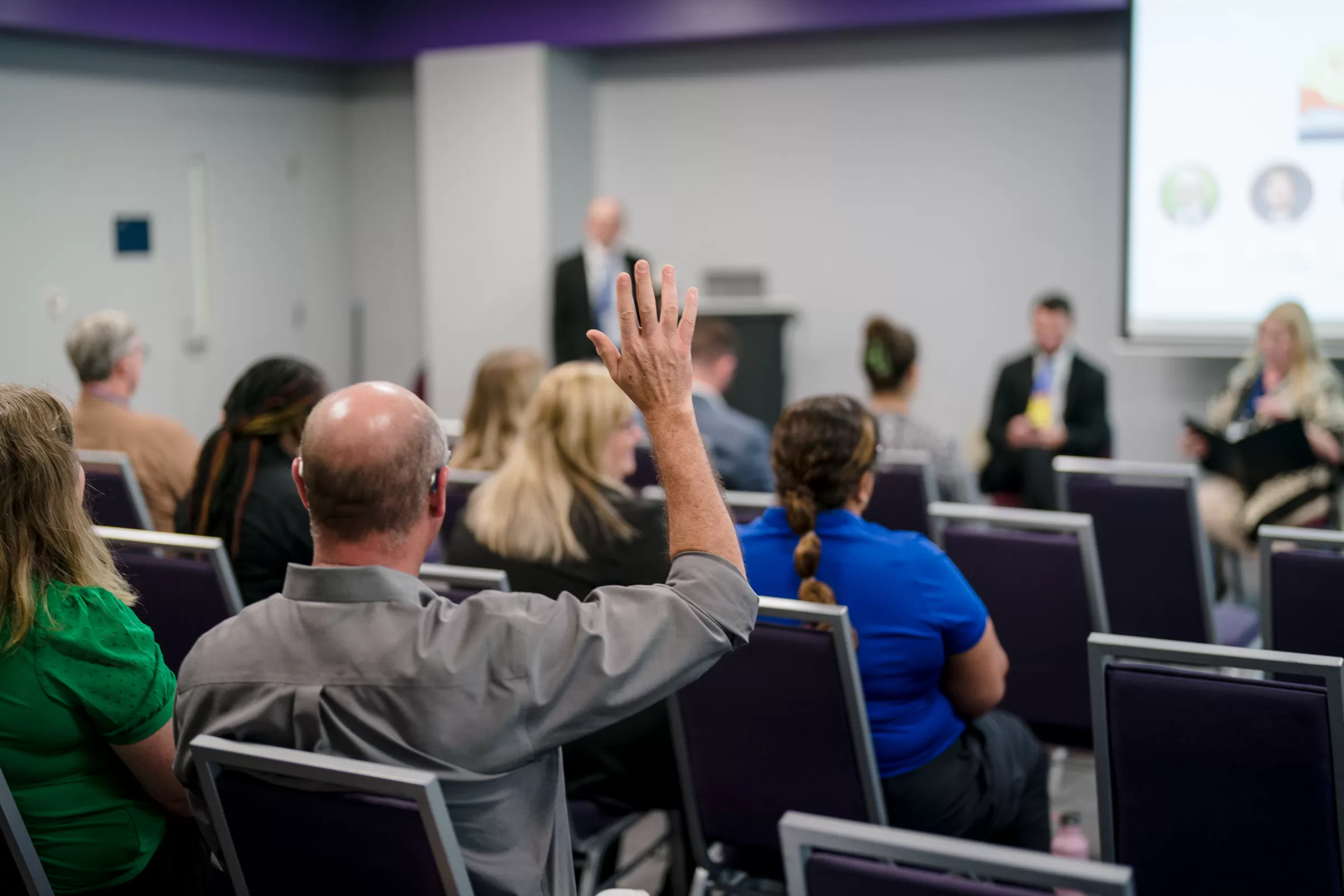What is the Clean Energy Academy?
The Clean Energy Academy is a technical assistance program that aims to support subnational organizations, such as healthcare systems, universities, faith groups, non-profits, in their deployment of clean energy solutions. Led by America is All In partner, RMI, the Academy is a resource hub for organizations who seek guidance on common implementation barriers such as financing, staff capacity, and others.
What is the Short Course on Direct Pay?
The Clean Energy Academy Short Course on Direct Pay will run for 3 months (March 2025 - June 2025). During this time, RMI and America Is All In would provide:
- A Workshop Series: Facilitated workshops to actively engage content experts and learn from peer organizations about how to secure the direct pay benefit. Participants may dive into key technical issues, lessons learned, and outstanding questions. Workshop topics may include the Inflation Reduction Act’s tax credits, including the Investment Tax Credit (ITC), Commercial Clean Vehicle Credit (45W), and Alternative Fuel Refueling Credit (30C).
- Technical Assistance: Office hours for one-on-one support to ensure that organizations understand how to claim clean energy implementation benefits from federal funding sources.
- Tools and Resources: Direct pay memos, best practices, and other tools that will accelerate Academy members’ planning process.
Who is participating in the Academy's Short Course on Direct Pay?
We are excited to share a number of organizations that are participating in our Short Course. Participants range from higher education to local municipalities, including organizations like:
- University of Utah, UT
- City of Beacon, NY
- Phipps Conservatory and Botanical Gardens, PA
- and more!
What are the key outcomes?
- Identify completed projects or near complete projects that are eligible for direct pay-eligible tax credits (e.g. EV chargers in rural and low-income census districts, solar PV, geothermal heat pumps, etc.).
- Coordinate an organizational approach to secure federal funding for clean energy investments.
- Register for direct pay and collect the tax credits' cash refund to recoup at least 30% of the project's costs.
What are participant expectations?
While participation in the program is free, RMI is only able to support a limited number of participating organizations. As such, priority will be given to institutions who demonstrate the following features as part of their request to participate:
- Project completion: Academy managers will give priority to projects completed in the 2024 calendar year or soon-to-be completed projects in 2025 that are eligible for federal clean energy tax credits, including the Investment Tax Credit (48), Clean Electricity Investment Tax Credit (48E), Alternative Fuel Vehicle Refueling Credit (30C), and Commercial Clean Vehicle Credit (45W).
- Implementation: The Academy will require active participation. Academy participants will need the necessary internal buy-in and approvals from decision makers and critical stakeholders (Note: RMI also recommends that participants integrate one or more key team members in the first two months of the program).
- Commitment: Participants must be able to dedicate an estimated 3-5 hours per month of staff time.

Get a sneak peek of what participants have been up to
Story highlight: Loyola University Chicago
Between two campus buildings and with Lake Michigan as a backdrop, twenty-two geothermal wells lay hidden underground at Loyola University Chicago. Though not the only geothermal system on campus, these wells came about recently as a “project of opportunity”— while undertaking a stormwater management project that uncovered this area of campus, the university realized it was a perfect place to add additional wells. Set to power two buildings and produce 135,000 kWh, the project also qualifies for Inflation Reduction Act funding, which the university is applying for with help from the Clean Energy Academy. With the wells hidden from view, Loyola has found other ways to make the project visible to students, so the floor of the School of Environmental Sustainability reveals the inner workings of another part of their geothermal system, with educational signs to show what’s happening under their feet.
Between two campus buildings and with Lake Michigan as a backdrop, twenty-two geothermal wells lay hidden underground at Loyola University Chicago. Though not the only geothermal system on campus, these wells came about recently as a “project of opportunity”— while undertaking a stormwater management project that uncovered this area of campus, the university realized it was a perfect place to add additional wells. Set to power two buildings and produce 135,000 kWh, the project also qualifies for Inflation Reduction Act funding, which the university is applying for with help from the Clean Energy Academy. With the wells hidden from view, Loyola has found other ways to make the project visible to students, so the floor of the School of Environmental Sustainability reveals the inner workings of another part of their geothermal system, with educational signs to show what’s happening under their feet.
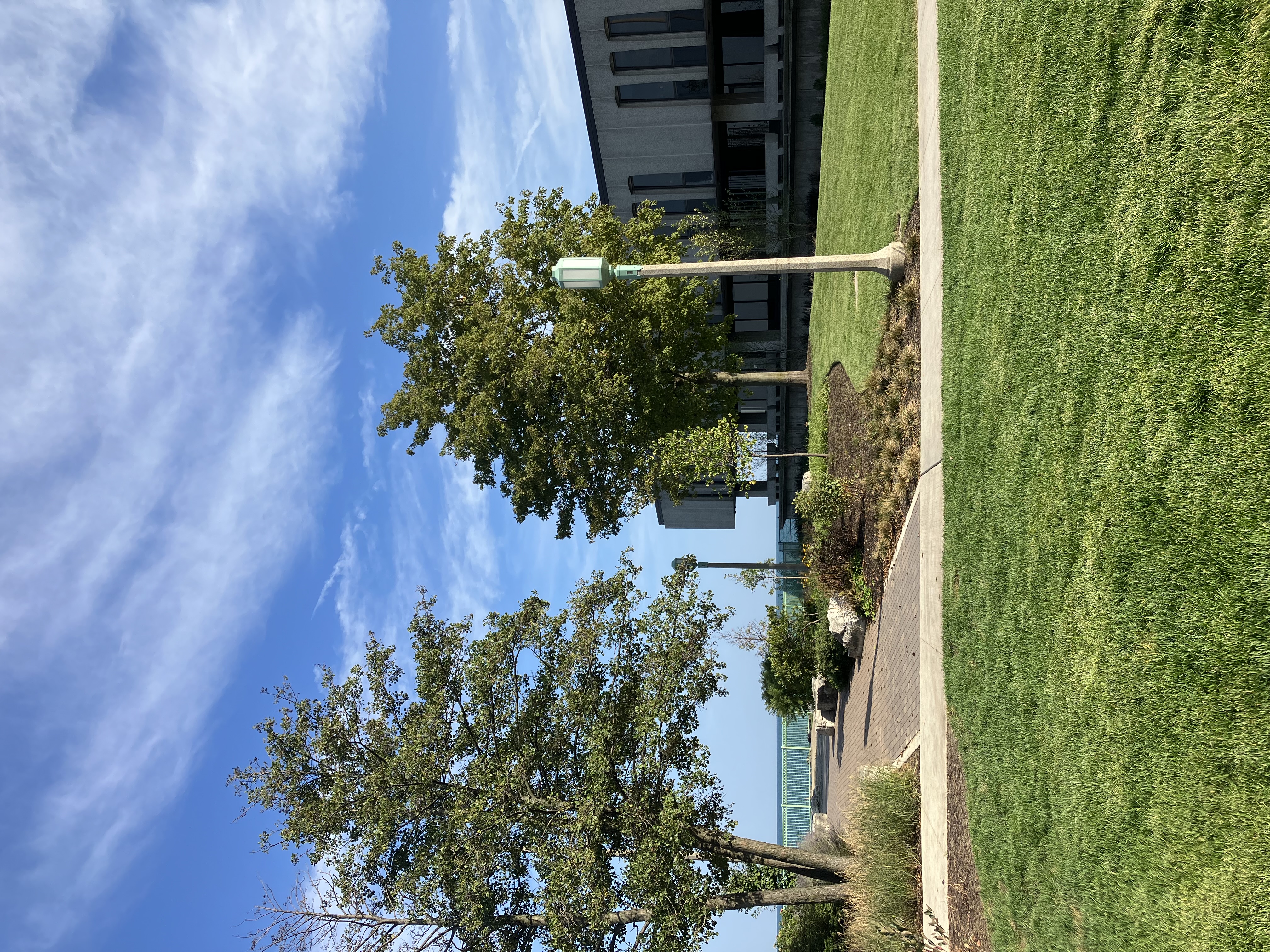
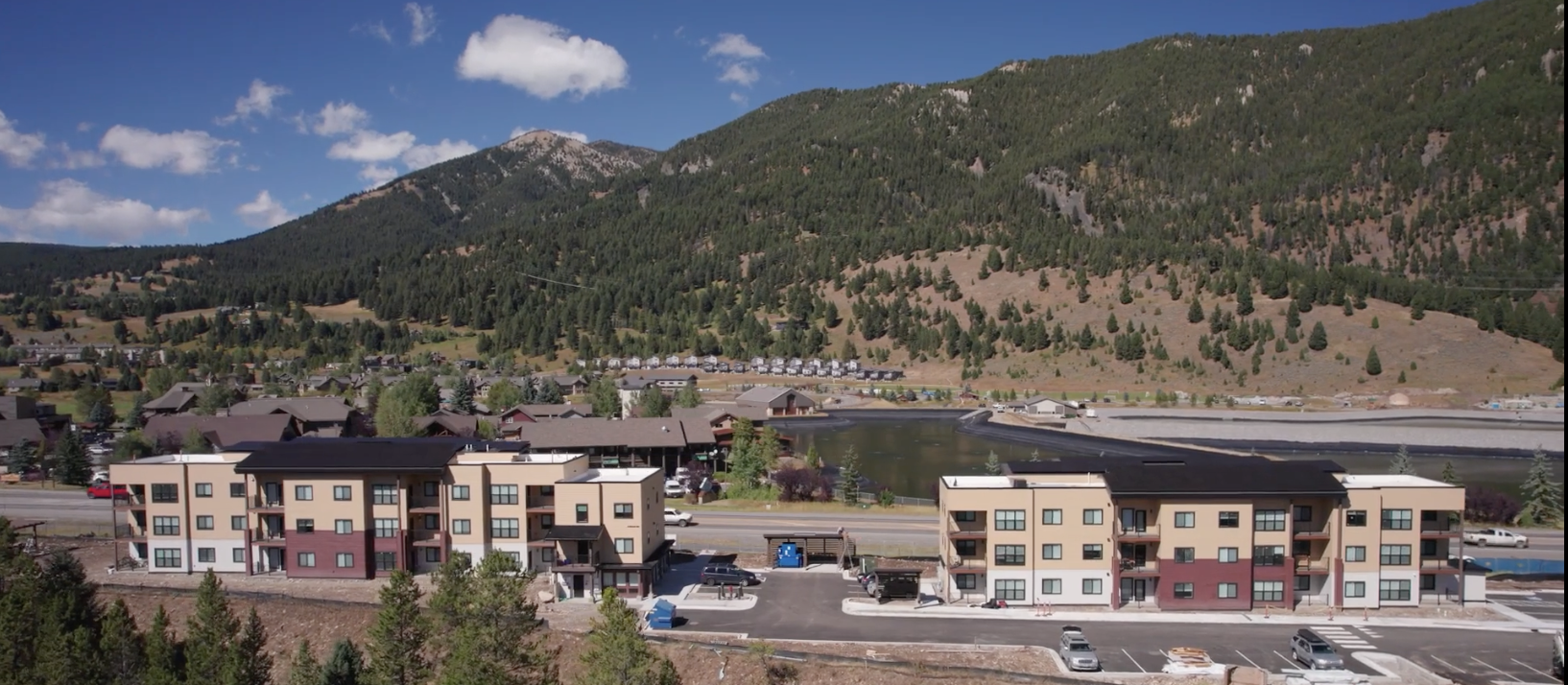
Story Highlight: Big Sky Sustainability Network Organization (SNO) and Big Sky Community Housing Trust
Solar panels can provide affordable housing with greater energy efficiency and lower electricity bills for residents. Big Sky SNO knew this and approached Big Sky Community Housing Trust to power the new Riverview apartment complex with solar energy—but they didn’t realize how much they could get back in federal tax credits until they participated in the Clean Energy Academy and learned they could leverage Direct Pay incentives to offset the upfront cost of the project. And with annual resident savings of $600, this partnership shows that future opportunities could yield similar benefits.
Solar panels can provide affordable housing with greater energy efficiency and lower electricity bills for residents. Big Sky SNO knew this and approached Big Sky Community Housing Trust to power the new Riverview apartment complex with solar energy—but they didn’t realize how much they could get back in federal tax credits until they participated in the Clean Energy Academy and learned they could leverage Direct Pay incentives to offset the upfront cost of the project. And with annual resident savings of $600, this partnership shows that future opportunities could yield similar benefits.
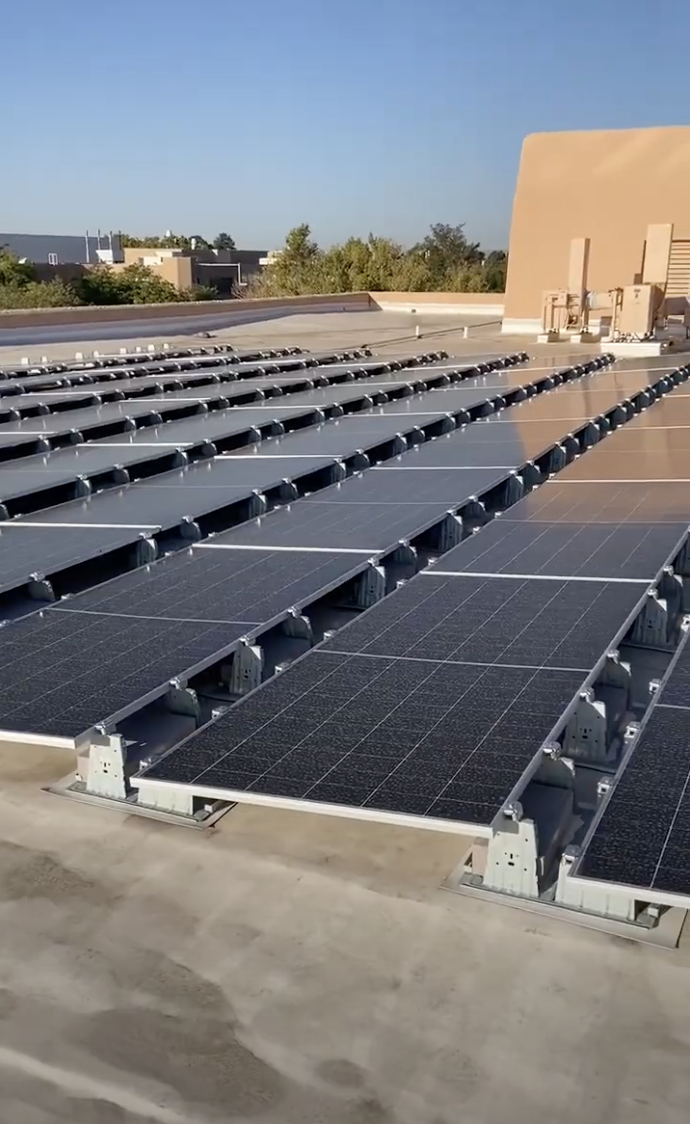
Story Highlight: University of New Mexico
The rooftop of the Student Union Building at the University of New Mexico provides a perfect place for solar panels to soak up the strong New Mexico sun and power the buildings below. With an array on part of the rooftop and plans for panels to cover the rest of it, the university has big goals for the future of renewable energy at the school. The university is taking advantage of not just the 30% Investment Tax Credit for the project, but also the low-income adder, which adds an additional incentive for projects located in low-income communities.
The rooftop of the Student Union Building at the University of New Mexico provides a perfect place for solar panels to soak up the strong New Mexico sun and power the buildings below. With an array on part of the rooftop and plans for panels to cover the rest of it, the university has big goals for the future of renewable energy at the school. The university is taking advantage of not just the 30% Investment Tax Credit for the project, but also the low-income adder, which adds an additional incentive for projects located in low-income communities.
